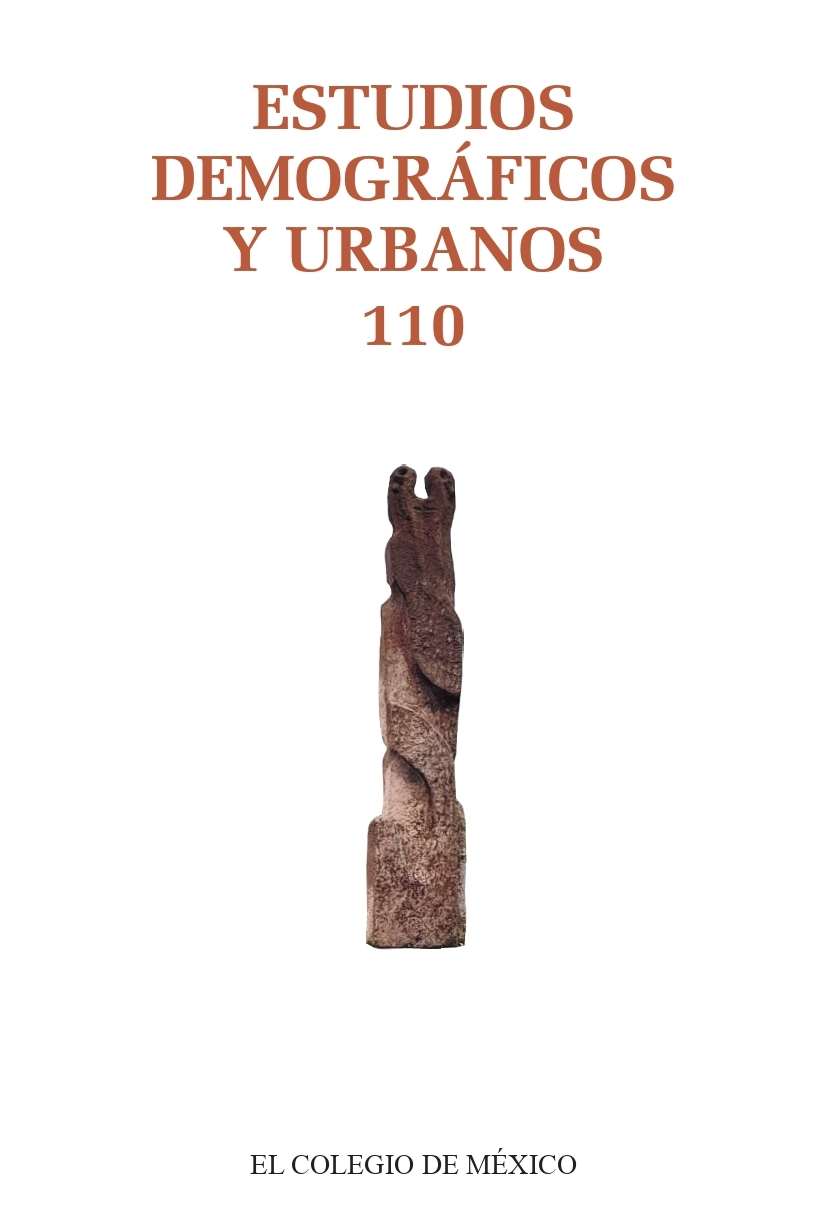Distribución del trabajo doméstico en hogares de parejas de hombres gay
Publicado 2022-05-25
Palabras clave
- trabajo doméstico,
- parejas del mismo sexo,
- análisis cualitativo,
- hombres gay,
- entrevistas semiestructuradas
Cómo citar
-
Resumen1190
-
PDF (español)593
-
En línea (español)121
-
EPUB (español)50
-
Kindle (español)50
-
Audio (español)6
Descargas
Derechos de autor 2022 Estudios Demográficos y Urbanos

Esta obra está bajo una licencia internacional Creative Commons Atribución-NoComercial-SinDerivadas 4.0.
Métrica
Resumen
A partir de entrevistas semiestructuradas realizadas a parejas corresidentes de hombres gay que viven en la ciudad de Santiago de Chile, se analiza la distribución del trabajo doméstico en sus hogares, así como los significados asociados a dicha distribución. Los resultados de la investigación muestran que, si bien algunas parejas entrevistadas sostienen un discurso igualitarista en lo que respecta a la distribución del trabajo doméstico, en la práctica se observa una desigual distribución de éste, tanto en términos de la cantidad de tiempo empleado, como en lo referente al tipo de tareas realizadas por cada uno. Junto a esto, los resultados muestran la existencia de una distribución más flexible que la observada en las parejas heterosexuales.
Referencias
- Aguiar Ferreira, I. (2017). Dinâmicas familiares em casais do mesmo sexo e sexo diferente: Distribuição das tarefas domésticas. (Tesis de maestría, Instituto Universitário de Lisboa, Portugal).
- Andréu, J. (2008). Las técnicas de análisis de contenido: una revisión actualizada. Fundación Centro Estudios Andaluces, 10(2), 1-34. http://mastor.cl/blog/wp-content/uploads/2018/02/Andreu.-analisis-de-contenido.-34-pags-pdf.pdf
- Álvarez Bernardo, G., Romo Avilés, N. y García Berbén, A. B. (2018). Doing gender in Spanish same-sex couples. The distribution of housework and childcare. Journal of Gender Studies, 27(6), 672-682. https://www.tandfonline.com/doi/full/10.1080/09589236.2017.1287067 DOI: https://doi.org/10.1080/09589236.2017.1287067
- Arriagada, I. (1990). La participación desigual de la mujer en el mundo del trabajo. Revista de la CEPAL, 40, 87-104. https://repositorio.cepal.org/handle/11362/11764 DOI: https://doi.org/10.18356/d5d8e3c4-es
- Balbo, L (1994). La doble presencia. En C. Borderías, C. Carrasco y C. Alemany (comps.), Las mujeres y el trabajo: rupturas conceptuales (pp. 503-514). Barcelona: Icaria.
- Barrett, C. (2015). Queering the home. The domestic labor of lesbian and gay couples in contemporary England. Journal Home Cultures, 12(2), 193-211. https://www.tandfonline.com/doi/full/10.1080/17406315.2015.1046298 DOI: https://doi.org/10.1080/17406315.2015.1046298
- Barrientos, J. (2016). Situación social y legal de gays, lesbianas y personas transgénero, y la discriminación contra estas poblaciones en América Latina. Sexualidad, Salud y Sociedad, 22, 331-354. https://www.scielo.br/scielo.php?pid=S1984-64872016000100331&script=sci_abstract&tlng=es DOI: https://doi.org/10.1590/1984-6487.sess.2016.22.15.a
- Basualdo, V. y Morales, D. (2014). La tercerización laboral: orígenes, impacto y claves para su análisis en América Latina. Buenos Aires: Siglo Veintiuno.
- Bianchi, S., Milkie, M., Sayer, L. y Robinson, J. (2000). Is anyone doing the housework? Trends in the gender division of household labor. Social Forces, 79(1), 191-228. https://academic.oup.com/sf/article/79/1/191/2233934 DOI: https://doi.org/10.2307/2675569
- Bittman, M., England, P., Sayer, L. Folbre, N. y Matheson, G. (2003). When does gender trump money? Bargaining and time in household work. American Journal of Sociology, 109(1), 186-214. https://www.journals.uchicago.edu/doi/10.1086/378341 DOI: https://doi.org/10.1086/378341
- Brewster, M. E. (2017). Lesbian women and household labor division: A systematic review of scholarly research from 2000 to 2015. Journal of Lesbian Studies, 21(1), 47-69. https://www.tandfonline.com/doi/full/10.1080/10894160.2016.1142350 DOI: https://doi.org/10.1080/10894160.2016.1142350
- Brines, J. (1994). Economic dependency, gender, and the division of labor at home. American Journal of Sociology, 100(3), 652-688. https://www.journals.uchicago.edu/doi/10.1086/230577 DOI: https://doi.org/10.1086/230577
- Bryson, R., Bryson, J., Licht, M. y Licht, B. (1976). The professional pair: Husband and wife psychologists. American Psychologist, 31(1), 10-16. https://psycnet.apa.org/record/1976-24628-001 DOI: https://doi.org/10.1037/0003-066X.31.1.10
- Campaña, J. C., Giménez-Nadal, J. I. y Molina, J. A. (2018). Gender norms and the gendered distribution of total work in Latin American households. Journal Feminist Economics, 24(1), 35-62. https://www.tandfonline.com/doi/abs/10.1080/13545701.2017.1390320 DOI: https://doi.org/10.1080/13545701.2017.1390320
- Campbell, F. (1970). Family growth and variation in family role structure. Journal of Marriage and the Family, 32(1), 45-53. https://www.jstor.org/stable/349971 DOI: https://doi.org/10.2307/349971
- Carrasco Bengoa, C. (2011). La economía del cuidado: planteamiento actual y desafíos pendientes. Revista de Economía Crítica, 11, 205-225. https://www.socioeco.org/bdf_fiche-document-5304_es.html
- Carrasquer, P., Torns, T., Tejero, E. y Romero, A. (1998). El trabajo reproductivo. Papers. Revista de Sociología, 55, 95-114. https://papers.uab.cat/article/view/v55-carrasquer-torns-tejero-etal/pdf-es DOI: https://doi.org/10.5565/rev/papers.1934
- Carrington, C. (1999). No place like home: Relationships and family life among lesbians and gay men. Chicago: University of Chicago Press. DOI: https://doi.org/10.7208/chicago/9780226094847.001.0001
- Ceballos Fernández, M. (2012). Familias homoparentales y trabajo doméstico: implicaciones para la disciplina del Trabajo Social. Comunitania. Revista Internacional de Trabajo Social y Ciencias Sociales, 4, 85-104. http://revistas.uned.es/index.php/comunitania/article/view/7129 DOI: https://doi.org/10.5944/comunitania.4.4
- Civettini, N. (2015). Gender display, time availability and relative resources: Applicability to housework contributions of members of same-sex couples. International Social Science Review, 91(1), 1-36. https://digitalcommons.northgeorgia.edu/cgi/viewcontent.cgi?article=1112&context=issr
- Civettini, N. (2016). Housework as non-normative gender display among lesbians and gay men. Sex Roles, 74(5-6), 206-219. https://doi.org/10.1007/s11199-015-0559-9 DOI: https://doi.org/10.1007/s11199-015-0559-9
- Coltrane, S. y Shih, K. Y. (2010). Gender and the division of labor. En J. C. Chrisler y D. R. McCreary (eds.), Handbook of gender research in psychology. Gender research in social and applied psychology. Vol. 2. (pp. 401-422). Nueva York: Springer. DOI: https://doi.org/10.1007/978-1-4419-1467-5_17
- Coverman, S. (1985). Explaining husbands’ participation in domestic labor. The Sociological Quarterly, 26(1), 81-97. https://onlinelibrary.wiley.com/doi/abs/10.1111/j.1533-8525.1985.tb00217.x DOI: https://doi.org/10.1111/j.1533-8525.1985.tb00217.x
- Cucchiari, S. (2013). Los orígenes de la jerarquía de género. En M. Lamas (comp.), El género. La construcción cultural de la diferencia sexual (pp. 181-264). Ciudad de México: Miguel Ángel Porrúa / Programa Universitario de Estudios de Género.
- Devetter, F. (2013). ¿Por qué externalizar las tareas domésticas? Análisis de las lógicas desigualitarias que estructuran la demanda en Francia. Revista de Estudios Sociales, 45, 80-95. https://journals.openedition.org/revestudsoc/7577?lang=es DOI: https://doi.org/10.7440/res45.2013.07
- Domínguez Amorós, M., Muñiz, L. y Rubilar Donoso, G. (2018). El trabajo doméstico y de cuidados en las parejas de doble ingreso. Análisis comparativo entre España, Argentina y Chile. Papers. Revista de Sociología, 104(2), 337-374. https://papers.uab.cat/article/view/v104-n2-dominguez-muniz-rubilar DOI: https://doi.org/10.5565/rev/papers.2576
- Farkas, G. (1976). Education, wage rates, and the division of labor between husband and wife. Journal of Marriage and the Family, 38(3), 473-483. https://www.jstor.org/stable/350416 DOI: https://doi.org/10.2307/350416
- Federici, S. (2018). El patriarcado del salario. Críticas feministas al marxismo. Madrid: Traficante de Sueños.
- Fernández, F. (2002). El análisis de contenido como ayuda metodológica para la investigación. Revista de Ciencias Sociales, 2(96), 35-53. https://www.revistacienciassociales.ucr.ac.cr/images/revistas/RCS96/03.pdf
- Fisher, K., Egerton, M., Gershuny, J. I. y Robinson, J. P. (2006). Gender convergence in the American Heritage Time Use Study (AHTUS). Social Indicators Research, 82, 1-33 https://link.springer.com/article/10.1007/s11205-006-9017-y DOI: https://doi.org/10.1007/s11205-006-9017-y
- Flick, U. (2007). El diseño de la investigación cualitativa. Madrid: Morata.
- Fraser, N. (2015). El capital y los cuidados. En Left Review 100 (pp. 111-132). Madrid: Traficante de Sueños.
- Galindo Vilchis, L. M. (2018). Los roles de género en la distribución de trabajo en familias homosexuales y en familias homoparentales de hombres en la Ciudad de México. Revista de Estudios de Género, La Ventana, 6(48), 48-91. http://revistalaventana.cucsh.udg.mx/index.php/LV/article/view/6756 DOI: https://doi.org/10.32870/lv.v6i48.6756
- Gallego Montes, G. y Vasco Alzate, J. F. (2017). Vida doméstica en parejas del mismo sexo en Ciudad de México y el eje cafetero colombiano. Notas de Población, 105, 85-105. https://repositorio.cepal.org/bitstream/handle/11362/43162/1/03_Gallego_105A.pdf DOI: https://doi.org/10.18356/c808dcaf-es
- Geist, C. (2010). Men’s and women’s reports about housework. En J. Treas y S. Drobnic (eds.), Dividing the domestic: Men, women, and household work in cross-national perspective (pp. 217-240). California: Stanford University Press. DOI: https://doi.org/10.11126/stanford/9780804763578.003.0011
- Goldberg, A. E. (2013). Doing and undoing gender: The meaning and division of housework in same-sex couples. Journal of Family Theory and Review, 5(2), 85-104. https://onlinelibrary.wiley.com/doi/abs/10.1111/jftr.12009 DOI: https://doi.org/10.1111/jftr.12009
- Gorman-Murray, A. (2006). Gay and lesbian couples at home: Identity work in domestic space. Journal Home Cultures, 3(2), 145-167. https://www.tandfonline.com/doi/abs/10.2752/174063106778053200 DOI: https://doi.org/10.2752/174063106778053200
- Greenstein, T. N. (2000). Economic dependence, gender, and the division of labor in the home: A replication and extension. Journal of Marriage and the Family, 62, 322-335. https://doi.org/10.1111/j.1741-3737.2000.00322.x DOI: https://doi.org/10.1111/j.1741-3737.2000.00322.x
- Gupta, S. (2007). Autonomy, dependence, or display? The relationship between married women’s earnings and housework. Journal of Marriage and Family, 69(2), pp. 399-417. https://www.jstor.org/stable/4622446 DOI: https://doi.org/10.1111/j.1741-3737.2007.00373.x
- Hernández Sampieri, R., Fernández Collado, C. y Baptista Lucio, M. (2014). Metodología de la investigación. Ciudad de México: McGraw Hill / Interamericana.
- Hiller, D. V. (1984). Power dependence and division of family work. Sex Roles, 10(11-12), 1003-1019. https://link.springer.com/article/10.1007/BF00288521 DOI: https://doi.org/10.1007/BF00288521
- Himmelweit, S., Santos, C., Sevilla, A. y Sofer, C. (2013). Sharing of resources within the family and the economics of household decision-making. Journal of Marriage and Family, 75(3), 625-639. https://onlinelibrary.wiley.com/doi/abs/10.1111/jomf.12032 DOI: https://doi.org/10.1111/jomf.12032
- Hobson, B. (1990). No exit, no voice: Women’s economic dependency and the welfare state. Acta Sociológica, 33(3), 235-250. https://journals.sagepub.com/doi/10.1177/000169939003300305 DOI: https://doi.org/10.1177/000169939003300305
- Kelly, M. y Hauck, E. (2015). Doing housework, redoing gender: Queer couples negotiate the household division of labor. Journal of GLBT Family Studies, 11(5), 438-464. https://www.tandfonline.com/doi/full/10.1080/1550428X.2015.1006750 DOI: https://doi.org/10.1080/1550428X.2015.1006750
- Lamas, M. (1996). La perspectiva de género. Revista de Educación y Cultura de la Sección 47 del SNTE, 8, 14-20. https://www.ses.unam.mx/curso2007/pdf/genero_perspectiva.pdf
- Larrañaga, I. (2004). El trabajo reproductivo o doméstico. Gaceta Sanitaria, 18(4), 31-37. http://scielo.isciii.es/scielo.php?script=sci_abstract&pid=S0213-91112004000400007 DOI: https://doi.org/10.1157/13062248
- Lastra Lastra, J. M. (2013). El outsourcing: visión iberoamericana. Boletín Mexicano de Derecho Comparado, 46(138), 1201-1205. http://www.scielo.org.mx/scielo.php?script=sci_arttext&pid=S0041-86332013000300015&lang=pt DOI: https://doi.org/10.1016/S0041-8633(13)71169-4
- Mallon, G. (2004). Gay men choosing parenthood. Nueva York: Columbia University Press. DOI: https://doi.org/10.7312/mall11796
- Oerton, S. (1997). Queer housewives? Some problems in theorising the division of domestic labour in lesbian and gay households. Women’s Studies International Forum, 20(3), 421-430. https://www.sciencedirect.com/science/article/abs/pii/S0277539597000253?via%3Dihub DOI: https://doi.org/10.1016/S0277-5395(97)00025-3
- Oerton, S. (1998). Reclaiming the “housewife”? Lesbians and household work. Journal of Lesbian Studies, 2(4), 63-83. https://www.tandfonline.com/doi/abs/10.1300/J155v02n04_06 DOI: https://doi.org/10.1300/J155v02n04_06
- Perrucci, C., Potter, H. y Rhoads, D. (1978). Determinants of male family-role performance. Psychology of Women Quarterly, 3(1), 53-66. https://onlinelibrary.wiley.com/doi/abs/10.1111/j.1471-6402.1978.tb00525.x DOI: https://doi.org/10.1111/j.1471-6402.1978.tb00525.x
- Rawsthorne, M. y Costello, M. (2010). Cleaning the sink: Exploring the experiences of Australian lesbian parents reconciling work/family responsibilities. Journal Community, Work and Family, 13(2), 189-204. https://www.tandfonline.com/doi/abs/10.1080/13668800903259777 DOI: https://doi.org/10.1080/13668800903259777
- Robinson, J. y Godbey, G. (1999). Time for life. State College, PA: Pennsylvania State University Press.
- Sayer, L. (2010). Trends in housework. En J. Treas y S. Drobnic (eds.), Dividing the domestic: Men, women, and household work in cross-national perspective (pp. 19-38). California: Stanford University Press. DOI: https://doi.org/10.11126/stanford/9780804763578.003.0002
- Senado Chile (2019). Tramitación de proyectos. https://www.senado.cl/appsenado/templates/tramitacion/
- Scott, J. W. (2016). Género: ¿todavía una categoría útil para el análisis? La Manzana de la Discordia, 6(1), 95. https://doi.org/10.25100/lamanzanadeladiscordia.v6i1.1514 DOI: https://doi.org/10.25100/lamanzanadeladiscordia.v6i1.1514
- Silverstein, L., Auerbach, C. y Levant, R. (2002). Contemporary fathers reconstructing masculinity: Clinical implications of gender role strain. Professional Psychology: Research and Practice, 33(4), 361-369. https://psycnet.apa.org/buy/2002-15385-002 DOI: https://doi.org/10.1037/0735-7028.33.4.361
- Stafford, R. Backman, E. y Dibona, P. (1977). The division of labor among cohabiting and married couples. Journal of Marriage and the Family. https://www.jstor.org/stable/351061 DOI: https://doi.org/10.2307/351061
- Sutphin, S. T. (2010). Social exchange theory and the division of household labor in same-sex couples. Journal Marriage and Family Review, 46(3), 191-206. https://www.tandfonline.com/doi/abs/10.1080/01494929.2010.490102 DOI: https://doi.org/10.1080/01494929.2010.490102
- Treas, J. (2010). Why study housework? En J. Treas y S. Drobnic (eds.), Dividing the domestic: Men, women, and household work in cross-national perspective (pp. 3-18). California: Stanford University Press. DOI: https://doi.org/10.2307/j.ctvqsdr20.6
- Van der Lippe, T. (1994). Spouses and their division of labor. Netherlands Journal of Social Sciences, 30, 43-62.
- Van der Lippe, T., Tijdens, K. y De Ruijter, E. (2004). Outsourcing of domestic tasks and time-saving effects. Journal of Family Issues, 25(2), 216-240. https://journals.sagepub.com/doi/10.1177/0192513X03257425 DOI: https://doi.org/10.1177/0192513X03257425
- Villasante, J. (2010). Tercerización: algo más que sólo un tema laboral. Foro Jurídico, 11, 286-292. http://revistas.pucp.edu.pe/index.php/forojuridico/article/viewFile/18596/18836



